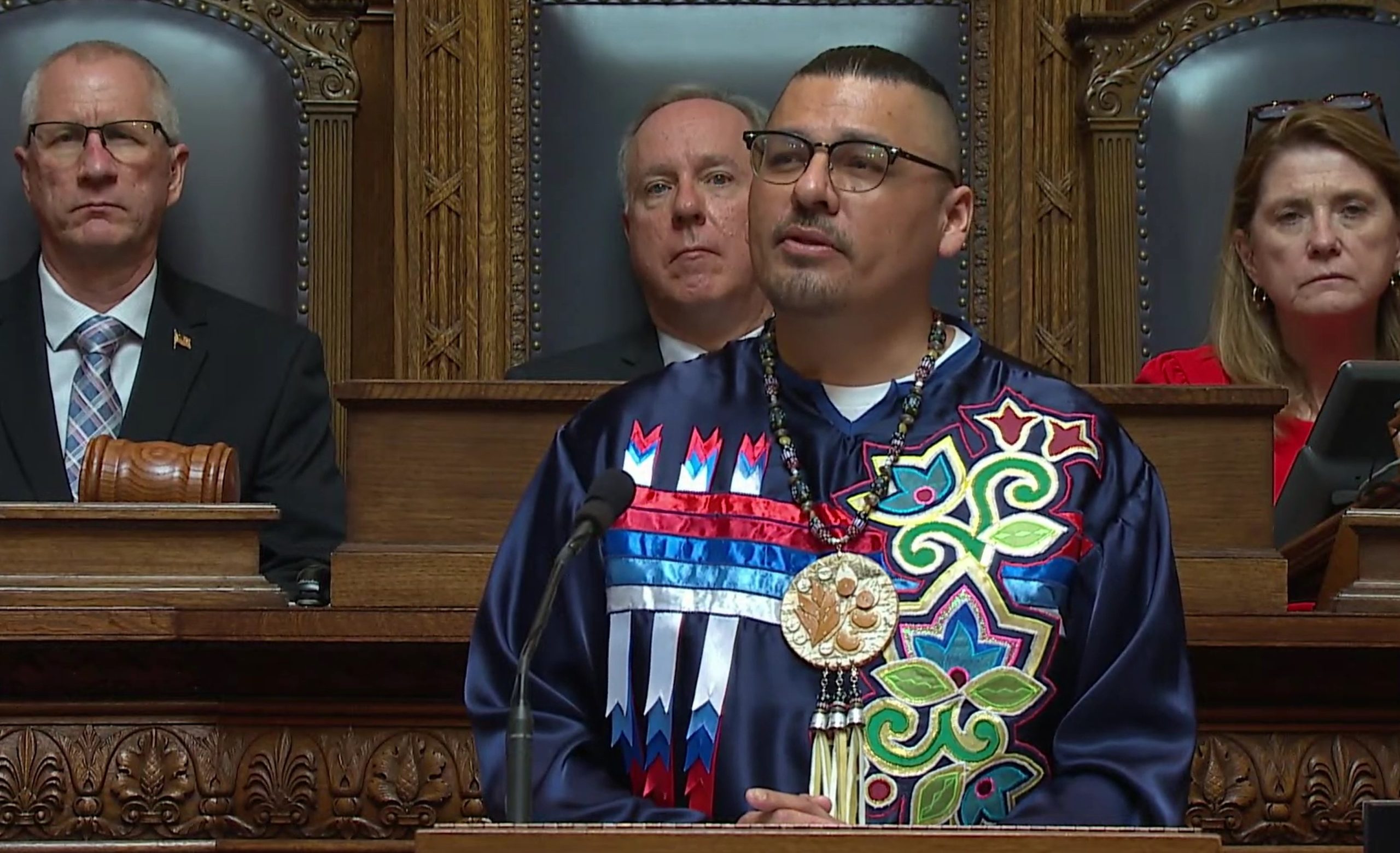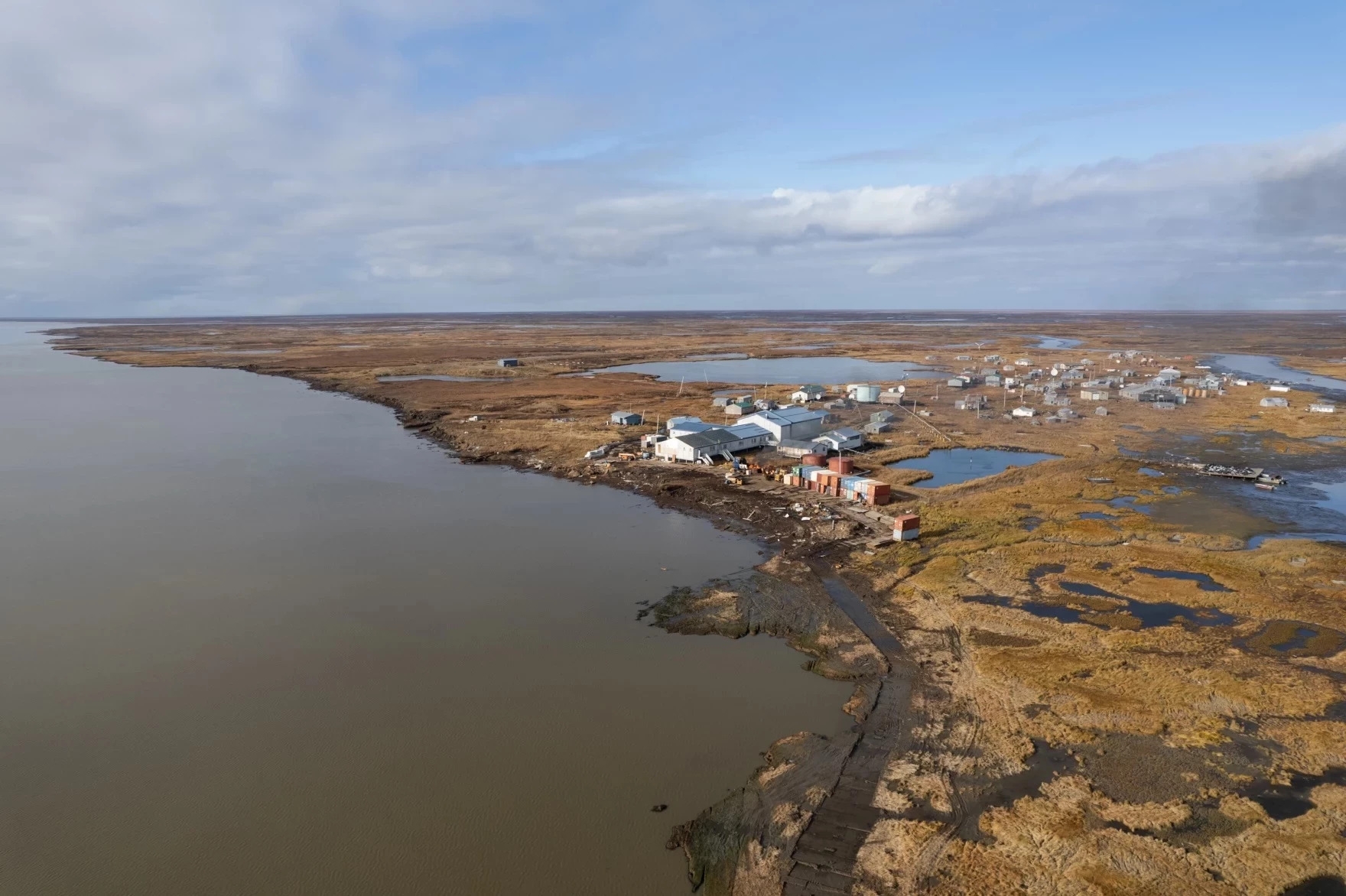Podcast: Play in new window | Download | Embed
Photo: Anti-DOGE/Elon Musk protest in Washington, D.C.’s Georgetown neighborhood on March 22, 2025. (Geoff Livingston / Flickr)
The chair of the Senate Indian Affairs Committee and other Republicans are pushing back against the Trump administration’s Diversity, Equity, and Inclusion (DEI) purge of Native Americans — quite literally — from federal government websites.
Correspondent Nicolae Butler reports from Washington that even members of the president’s own party are aghast at efforts to erase First Americans from government websites.
At the U.S. Capitol, Republicans are more unified than the party’s been in decades, if not a century as the party rallies around most all of President Donald Trump’s recent efforts to reshape Washington in his own image. But even members of the president’s own party are aghast at efforts to erase First Americans from government websites.
Elon Musk and the Department of Government Efficiency (DOGE) team seem to have crossed an unwritten Republican red line when they literally erased the term “Native American” from some government sites.
U.S. Sen. Kevin Cramer (R-ND) told National Native News at the Capitol he doesn’t “know why you just do that as a matter of course.”
Other Republicans are struggling to even grasp what Musk and his team did.
U.S. Sen. James Lankford (R-OK) told National Native News he “hadn’t seen that, so I have no idea.”
Still, other Republicans, like U.S. Sen. Dan Sullivan (R-AK), are confused by what DOGE did, even after we told him what was deleted from federal websites, because it’s so incomprehensible to them.
“Wait, I don’t understand the question.”
It’s more than just deleting the term “Native American”, which critics say is bad enough, but Department of Defense web pages honoring Navajo Code Talkers were also deleted.
The administration says it restored the pages, calling it a “mistake”, but the “mistakes” didn’t stop there.
Sen. Cramer said he’s no fan of DEI, but the administration went too far this time.
“If it’s Native American, it’s Native American. I don’t know. You can’t — I don’t know. I mean, seems weird. I don’t know why you do that, But first thing I would do is check with local Native people to see what their preference is, because some of them don’t like it.”
U.S. Sen. Lisa Murkowski (R-AK), chair of the Senate Indian Affairs Committee, has been leaning on officials at the Interior Department and Health and Human Services (HHS) to ensure tribal programs aren’t caught up in this DEI purge.
“We were worried about that right at the outset, right? And that was why it was important to get some assurance, some confirmation that when it came to tribes and tribal programs, they were not going to be subject to this DEI initiative. We got that assurance through Interior; we got it through HHS.”
But Sen. Murkowski says other federal agencies have some catching up to do.
“But we’re seeing this in other accounts, which is troubling. We’ve reached out to address this, because it’s not the way it should be.”
Alaska’s other senator, Sen. Sullivan, calls the erasure of tribal references a “huge” misstep. The Republican suggests Musk and his DOGE team are in need of a history lesson.
“Tribes and Native Americans are in the Constitution. Maybe some people should go reread their Constitution.”
The LCB contributed to this report from Washington.
 In Oregon, the search for a missing Grande Ronde tribal elder continued over the weekend.
In Oregon, the search for a missing Grande Ronde tribal elder continued over the weekend.
63-year-old Jonathan House disappeared in mid-March after leaving a crashed truck in the Coast Range foothills west of Junction City.
As KLCC’s Brian Bull reports, prospects are dim that House is still alive.
House was said to be upset when he drove off from home, and flyers say he sounded distressed in his last call to his partner on March 15.
This weekend, teams with the Lane County Sheriff’s Office and the MMIW Search & Hope Alliance searched around Dancing Deer Mountain.
Bill Barnard covered almost 800 acres with his drone.
“The Sheriff’s Office was kind enough to share the coordinates of the last cell phone ping. Unfortunately, that indicated that he didn’t progress towards town or towards a road. It actually indicated that he headed deeper into the forest.”
Kim Lining organized the volunteer search. Given the time and elements, she knows it’s looking dire for House.
“We’re not going to stop looking for him. He’s out there, somewhere. We’re looking for his body, his remains. The family is very understanding and thankful, and really great.”
Anyone with information on House is asked to call the Lane County Sheriff’s Office.
Get National Native News delivered to your inbox daily. Sign up for our daily newsletter today.



 In a rare move, six tribal nations in Michigan have withdrawn from discussions on a federal permit for the Line 5 tunnel, which the Canadian company Enbridge wants to build under the Straits of Mackinac.
In a rare move, six tribal nations in Michigan have withdrawn from discussions on a federal permit for the Line 5 tunnel, which the Canadian company Enbridge wants to build under the Straits of Mackinac.
 A report that highlighted the crisis of Missing and Murdered Indigenous people was removed from several federal websites last month, to the disappointment of some Alaska Native advocates.
A report that highlighted the crisis of Missing and Murdered Indigenous people was removed from several federal websites last month, to the disappointment of some Alaska Native advocates. The Center for Native American Youth has announced its newest cohort of the
The Center for Native American Youth has announced its newest cohort of the  The number of Alaska Native language speakers has been declining over the years including speakers of Alutiiq.
The number of Alaska Native language speakers has been declining over the years including speakers of Alutiiq. The U.S. Postal Service is hosting a first-day-of-issue ceremony for its Forever stamps celebrating powwows.
The U.S. Postal Service is hosting a first-day-of-issue ceremony for its Forever stamps celebrating powwows.
 Native American students in New Mexico will be able to wear their tribal regalia at graduation ceremonies this spring after Gov. Michelle Lujan Grisham (D-NM) signed a bill into law on Wednesday.
Native American students in New Mexico will be able to wear their tribal regalia at graduation ceremonies this spring after Gov. Michelle Lujan Grisham (D-NM) signed a bill into law on Wednesday. And yesterday we reported on the disappearance of references to Navajo Code Talkers on U.S. military websites.
And yesterday we reported on the disappearance of references to Navajo Code Talkers on U.S. military websites.


